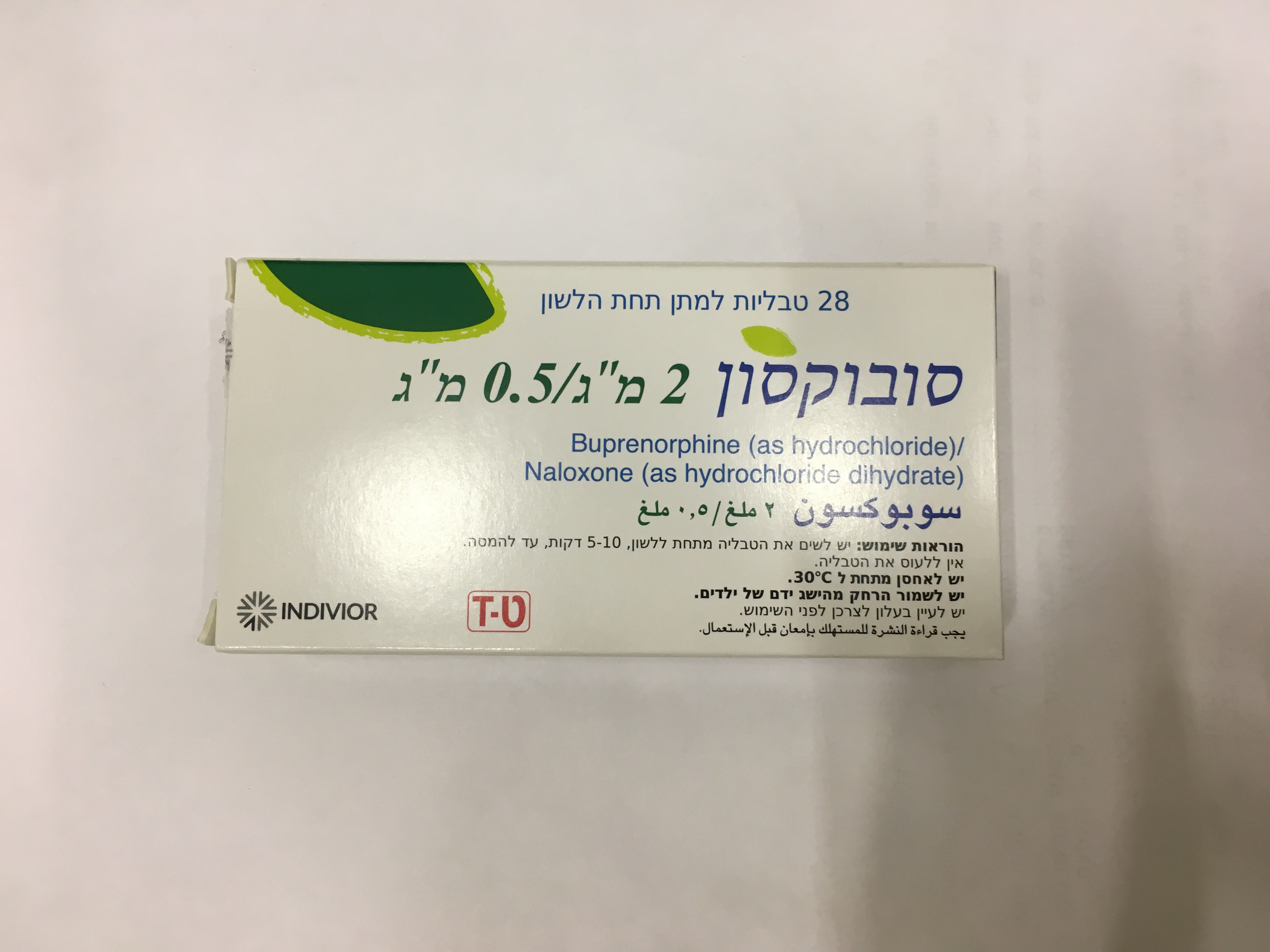Quest for the right Drug

סובוקסון 2 מ"ג/ 0.5 מ"ג SUBOXONE 2 MG/0.5 MG (BUPRENORPHINE HYDROCHLORIDE, NALOXONE HYDROCHLORIDE DIHYDRATE)
תרופה במרשם
תרופה בסל
נרקוטיקה
ציטוטוקסיקה
צורת מתן:
פומי : PER OS
צורת מינון:
טבליות למתן מתחת ללשון : TABLETS SUBLINGUAL
עלון לרופא
מינוניםPosology התוויות
Indications תופעות לוואי
Adverse reactions התוויות נגד
Contraindications אינטראקציות
Interactions מינון יתר
Overdose הריון/הנקה
Pregnancy & Lactation אוכלוסיות מיוחדות
Special populations תכונות פרמקולוגיות
Pharmacological properties מידע רוקחי
Pharmaceutical particulars אזהרת שימוש
Special Warning עלון לרופא
Physicians Leaflet
Adverse reactions : תופעות לוואי
4.8 Undesirable effects Summary of the safety profile The most commonly reported treatment related adverse reactions reported during the pivotal clinical studies were constipation and symptoms commonly associated with drug withdrawal (i.e. insomnia, headache, nausea, hyperhidrosis and pain). Some reports of seizure, vomiting, diarrhoea, and elevated liver function tests were considered serious. Tabulated list of adverse reactions Table 1 summarizes adverse reactions reported from pivotal clinical trials in which, 342 of 472 patients (72.5 %) reported adverse reactions and adverse reactions reported during post-marketing surveillance. The frequency of possible undesirable effects listed below is defined using the following convention: Very common (1/10), Common (1/100 to <1/10), Uncommon (1/1,000 to <1/100), Not known (cannot be estimated from available data). Table 1: Treatment-related adverse reactions reported in clinical trials and post-marketing surveillance of buprenorphine/naloxone System Organ Class Very common Common Uncommon Not known Infections and Influenza Urinary tract infection infestations Infection Vaginal infection Pharyngitis Rhinitis Blood and lymphatic Anaemia system disorders Leukocytosis Leukopenia Lymphadenopathy Thrombocytopenia Immune system Hypersensitivity Anaphylactic shock disorders Metabolism and Decreased appetite nutrition disorders Hyperglycaemia Hyperlipidaemia Hypoglycaemia Psychiatric disorders Insomnia Anxiety Abnormal dreams Hallucination Depression Agitation Libido decreased Apathy Nervousness Depersonalisation Thinking abnormal Drug dependence Euphoric mood Hostility Nervous system Headache Migraine Amnesia Hepatic disorders Dizziness Hyperkinesia encephalopathy Hypertonia Seizure Syncope Paraesthesia Speech disorder Somnolence Tremor Eye disorders Amblyopia Conjunctivitis Lacrimal disorder Miosis Ear and labyrinth Vertigo disorders Cardiac disorders Angina pectoris Bradycardia Myocardial infarction Palpitations Tachycardia Vascular disorders Hypertension Hypotension Orthostatic Vasodilatation hypotension Respiratory, thoracic Cough Asthma Bronchospasm and mediastinal Dyspnea Respiratory depression disorders Yawning Gastrointestinal Constipation Abdominal pain Mouth ulceration disorders Nausea Diarrhoea Tongue discolouration Dyspepsia Flatulence Vomiting Hepatobiliary Hepatitis disorders Hepatitis acute Jaundice Hepatic necrosis Hepatorenal syndrome Skin and subcutaneous Hyperhidrosis Pruritus Acne Angioedema tissue disorders Rash Alopecia Urticaria Dermatitis exfoliative Dry skin Skin mass Musculoskeletal and Back pain Arthritis connective tissue Arthralgia disorders Muscle spasms Myalgia Renal and urinary Urine abnormality Albuminuria disorders Dysuria Haematuria Nephrolithiasis Urinary retention Reproductive system Erectile dysfunction Amenorrhoea and breast disorders Ejaculation disorder Menorrhagia Metrorrhagia General disorders and Drug withdrawal Asthenia Hypothermia Drug withdrawal administration site syndrome Chest pain syndrome neonatal conditions Chills Pyrexia Malaise Pain Oedema peripheral Investigations Liver function test Blood creatinine Transaminases abnormal increased increased Weight decreased Injury, poisoning and Injury Heat stroke procedural complications Description of selected adverse reactions In cases of intravenous drug misuse, some adverse reactions are attributed to the act of misuse rather than the medicinal product and include local reactions, sometimes septic (abscess, cellulitis), and potentially serious acute hepatitis, and other infections such as pneumonia, endocarditis have been reported (see section 4.4). In patients presenting with marked drug dependence, initial administration of buprenorphine can produce a drug withdrawal syndrome similar to that associated with naloxone (see sections 4.2 and 4.4). Reporting of suspected adverse reactions Reporting suspected adverse reactions after authorisation of the medicinal product is important. It allows continued monitoring of the benefit/risk balance of the medicinal product. Any suspected adverse events should be reported to the Ministry of Health according to the National Regulation by using an online form https://sideeffects.health.gov.il/

שימוש לפי פנקס קופ''ח כללית 1994
לא צוין
תאריך הכללה מקורי בסל
09/01/2013
הגבלות
תרופה מוגבלת לרישום ע'י רופא מומחה או הגבלה אחרת
מידע נוסף
